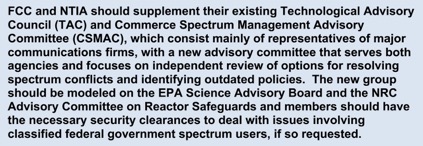An Open Letter to David Redl Upon His Confirmation as NTIA Administrator

Congratulations on your appointment and confirmation as Assistant Secretary of Commerce for Communications and Information/NTIA Administrator! NTIA has many responsibilities, but this post will focus on its spectrum management ones - a key issue in our increasingly spectrum-dependent world. On behalf of the President, NTIA administers his jurisdiction for use of the spectrum by federal agencies. But in reality the "elephant in the room" is the Interdepartment Radio Advisory Committee (IRAC) whose origin goes back to the 1920s.
While Title IX of the Communications Act which codifies NTIA's establishment barely mentions IRAC, the role of IRAC is as mysterious are the role of the Politburo in the former Soviet Union. Does IRAC "advise" NTIA or does IRAC actually make most of the decisions with occasional oversight from NTIA when either Congress gets interested or a private sector entity has enough political power?
I would urge you to read Nobelist Ronald Coase's report "Problems of Radio Frequency Allocation" which was written in the early 1960s but suppressed for about 30 years. In particular, I suggest you review the IRAC and FCC discussion on p. 44-72 (pdf p.52-80). While this material was written decades before the creation of NTIA and several years before even the creation of the former OTP, where the late Justice Scalia served, to many of us it is the best description of IRAC practices that exists in the public domain. The report has citations to hearing and reports on spectrum management going back to WWII. It reveals (p. 59, pdf. p. 66) that as early as 1950 legislation was introduced to create an independent agency in the federal government to "formulate plans and policies for the utilization of spectrum".
I was privileged to have a discussion with the late Justice Scalia about 5 years ago on how federal spectrum management worked in OTP days. (There are a few other OTP veterans still active in the field, so I urge you to reach out to them for insight.) While OTP Director Whitehead let IRAC handle many functions, he was willing to and actually did intervene much more than NTIA has in recent decades. In particular, he was willing to call cabinet members directly to get them to reverse positions their agencies had taken in IRAC - generally without knowledge of top agencies officials in a "deep state"-like arrangement.
Of course, Whitehead's White House phone number helped a lot! While the 2012 PCAST spectrum report may be falling out of favor in the current Administration, I urge you to review Section V which is not controversial and particular Recommendation 5.1 on increasing the White House role in spectrum policy:

After the PCAST report there was a slightly increase spectrum policy presence in the White House with the detail of an NTIA middle manager to OSTP. Due to budget constraints, this OSTP specialist was actually paid by NTIA and was expected to return there. The White House needs more of a point person on spectrum policy and this is important enough that person should be independent of BOTH FCC and NTIA.
The NTIA spectrum staff seem to think that they can't really regulate other federal agencies and that no other agency can regulate such agencies in any matter. Let me point out some examples:
- EPA regulates pollution from federal agency activities
- OSHA regulates federal workplace safety
- GSA regulates federal real property (e.g. buildings and land)
- NRC regulates nonweapons related federal use of radioactive material
- OPM regulates federal personnel policies
- NSA regulates federal agency use of encryption
Early in my FCC career I used to periodically attend IRAC meetings and as well as meetings of an interagency committee at NSA that dealt with federal encryption equipment and its use. In both cases the groups were discussing policies that would apply to the agencies present. The key different was that IRAC thought they could make decisions based solely on the consensus of those present and that that broader "public interest" did not explicitly matter since the IRAC members were all public employees! In the NSA group it was clear that NSA was in charge and had a charter from POTUS but wanted to hear and consider the views of affected agencies. BIG DIFFERENCE!
Both NTIA and FCC really are understaffed with people who can do independent technical review of spectrum sharing issues, particularly novel ones. Thus you might want to consider this recommendation from IEEE-USA on creating a new advisory committee to both FCC and NTIA of technical experts without industry ties who can look independently at technical issues of spectrum sharing and interference and suggest possible solutions to difficult problems to both agencies. Since the physics is the same from both G and NG radio signals it makes sense to have on committee serve both and would save money since nonindustry advisory board members must get paid for their time..

(Note that since this was drafted last year the EPA SAB has changed significantly and has become controversial.
However, the NRC group still has the same structure.)
So Mr. Redl, congratulations and let's hope that you can take an open minded approach to finding a new clarification on the relative roles of IRAC and NTIA in managing spectrum.



![Validate my RSS feed [Valid RSS]](valid-rss-rogers.png)

